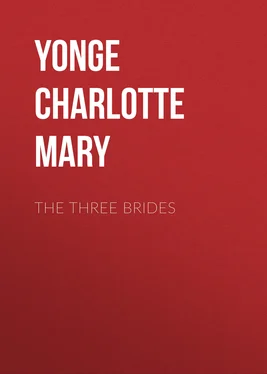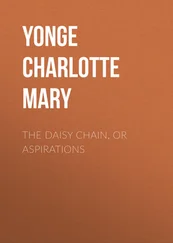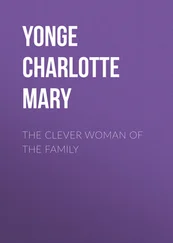Charlotte Yonge - The Three Brides
Здесь есть возможность читать онлайн «Charlotte Yonge - The Three Brides» — ознакомительный отрывок электронной книги совершенно бесплатно, а после прочтения отрывка купить полную версию. В некоторых случаях можно слушать аудио, скачать через торрент в формате fb2 и присутствует краткое содержание. Жанр: foreign_prose, literature_19, Европейская старинная литература, foreign_antique, на английском языке. Описание произведения, (предисловие) а так же отзывы посетителей доступны на портале библиотеки ЛибКат.
- Название:The Three Brides
- Автор:
- Жанр:
- Год:неизвестен
- ISBN:нет данных
- Рейтинг книги:4 / 5. Голосов: 1
-
Избранное:Добавить в избранное
- Отзывы:
-
Ваша оценка:
- 80
- 1
- 2
- 3
- 4
- 5
The Three Brides: краткое содержание, описание и аннотация
Предлагаем к чтению аннотацию, описание, краткое содержание или предисловие (зависит от того, что написал сам автор книги «The Three Brides»). Если вы не нашли необходимую информацию о книге — напишите в комментариях, мы постараемся отыскать её.
The Three Brides — читать онлайн ознакомительный отрывок
Ниже представлен текст книги, разбитый по страницам. Система сохранения места последней прочитанной страницы, позволяет с удобством читать онлайн бесплатно книгу «The Three Brides», без необходимости каждый раз заново искать на чём Вы остановились. Поставьте закладку, и сможете в любой момент перейти на страницу, на которой закончили чтение.
Интервал:
Закладка:
“So they get themselves talked of!” said Julius, as Anne’s quiet entrance broke up the dialogue.
Mrs. Poynsett had listened, glad there was no appeal to her, conscious that she did not understand the merits of the case, and while she doubted whether her eldest son had love enough, somewhat afraid lest his brother had not rather too much for the good of his lawful supremacy.
CHAPTER VII
Unfruitful Suggestions
“Raymond! Can you spare me a moment before you go into your mother’s room?”
It was Rosamond who, to his surprise, as he was about to go down-stairs, met him and drew him into her apartment—his mother’s own dressing-room, which he had not entered since the accident.
“Is anything the matter?” he said, thinking that Julius might have spared him from complaints of Cecil.
“Oh no! only one never can speak to you, and Julius told me that you could tell me about Mrs. Poynsett. I can’t help thinking she could be moved more than she is.” Then, as he was beginning to speak, “Do you know that, the morning of the fire, I carried her with only one of the maids to the couch under the tent-room window? Susan was frightened out of her wits, but she was not a bit the worse for it.”
“Ah! that was excitement.”
“But if it did not hurt her then, why should it hurt her again? There’s old General M’Kinnon, my father’s old friend, who runs about everywhere in a wheeled-chair with a leg-rest; and I can’t think why she should not do the same.”
Raymond smiled kindly on her, but rather sadly; perhaps he was recollecting his morning’s talk about the occupancy of the drawing-room. “You know it is her spine,” he said.
“So it is with him. His horse rolled over him at Sebastopol, and he has never walked since. I wanted to write to Mary M’Kinnon; but Julius said I had better talk to you, because he was only at home for a fortnight, when she was at the worst, and you knew more about it.”
“Yes,” said Raymond, understanding more than the Irish tongue fully expressed. “I never saw a woman sit better than she did, and she looked as young and light in the saddle as you could, till that day, when, after the rains, the bank where the bridle-path to Squattles End was built up, gave way with the horse’s feet, and down she went twenty feet, and was under the horse when Miles and I got down to her! We brought her on a mattress to that room, not knowing whether she were alive; and she has never moved out of it! It was agony to her to be touched.”
“Yes but it can’t be that now. Was not that three years ago?”
“Not so much. Two and a half. We had Hayter down to see her, and he said perfect rest was the only chance for her.”
“And has not he seen her lately?”
“He died last winter; and old Worth, who comes in once a week to look at her, is not fit for more than a little watching and attention. I dare say we all have learnt to acquiesce too much in her present state, and that more might be done. You see she has never had a lady’s care, except now and then Jenny Bowater’s.”
“I do feel sure she could bear more now,” said Rosamond, eagerly. “It would be such a thing if she could only be moved about that down-stairs floor.”
“And be with us at meals and in the evening,” said Raymond, his face lightening up. “Thank you, Rosamond!”
“I’ll write to Mary M’Kinnon to-morrow, to ask about the chair,” cried Rosamond; and Raymond, hearing the door-bell, hurried down, to find his wife standing alone over the drawing-room fire, not very complacent.
“Where have you been, Raymond?”
“I was talking to Rosamond. She has seen a chair on which it might be possible to move my mother about on this floor.”
“I thought—” Cecil flushed. She was on the point of saying she thought Rosamond was not to interfere in her department any more than she in Rosamond’s; but she kept it back, and changed it into “Surely the doctor and nurses must know best.”
“A fresh eye often makes a difference,” said Raymond. “To have her among us again—!” but he was cut short by the announcement of Mr. and Miss Fuller.
“Poor Mr. Fuller,” as every one called him, was the incumbent of St. Nicholas, Willansborough, a college living always passed by the knowing old bachelor fellows, and as regularly proving a delusion to the first junior in haste for a wife. Twenty-five years ago Mr. Fuller had married upon this, which, as Mr. Bindon said, was rather a reason for not marrying—a town with few gentry, and a petty unthriving manufacture, needing an enormous amount of energy to work it properly, and getting—Mr. Fuller, with force yearly decreasing under the pressure of a sickly wife, ill-educated, unsatisfactory sons, and unhealthy, aimless daughters. Of late some assistance had been obtained, but only from Mr. Driver, the ‘coach’ or cramming tutor, who was directing the studies of Frank and half a dozen more youths, and his aid was strictly limited to a share in the Sunday services.
The eldest daughter accompanied the Vicar. Her mother had not health (or perhaps clothes) for a dinner-party, and it was the first time she had ever been in the house. Very shy and in much awe she was! Cecil viewed her as a constituent, and was elaborately civil and patronizing, doing the honours of all the photographs and illustrations on which she could lay hands, and only eliciting alternately ‘Very nice,’ and ‘How sweet!’ A little more was made of the alarms of the fire, and the preparations for clearing the house, and there was a further thaw about the bazaar. It would be such a relief from plain work, and she could get some lovely patterns from her cousin who had a missionary basket; but as to the burnt-out families, the little knowledge or interest she seemed to have about them was rather astounding, unless, as Rosamond suspected, she thought it ‘shop,’ and uninteresting to the great ladies of Compton-Poynsett Hall.
Meanwhile, her father made the apprehended request for the loan of Compton Church during the intervals of services, and when the Rector explained how brief those intervals would be, looked astonished, and dryly complimented him on his energy and his staff, somewhat as if the new broom were at the bottom of these congratulations.
The schools were to be used for services until a temporary iron church could be obtained, for which Julius, to make up for his churlishness in withholding his own church, made the handsomer donation, and held out hopes of buying it afterwards for the use of Squattles End. Then, having Mr. Fuller’s ear to himself, he ventured to say, though cautiously, as to one who had been a clergyman before he was born, “I wish it were possible to dispense with this bazaar.”
Mr. Fuller shrugged his shoulders. “If every one subscribed in the style of this family.”
“They would be more likely to do so, without the appeal to secondary motives.”
“Try them,” said the elder man.
“Exactly what I want to do. I would put up the four walls, begin with what you get from the insurance, a weekly offertory, and add improvements as means came in. This is not visionary. I have seen proof of its success.”
“It may serve in new-fashioned city missions, but in an old-established place like this it would create nothing but offence. When you have been in Orders as long as I have, you will find that there is nothing for it but to let people do what they will, not what one thinks best.”
“Mr. Fuller,” said Julius, eagerly, “will you try an experiment? Drop this bazaar, and I promise you our collection every Sunday evening for the year, giving notice of it to my people, and to such of yours as may be present.”
“I do not despise your offer,” said Mr. Fuller, laying his hand upon his arm. “You mean it kindly, and if I were in your place, or had only my own feelings to consider, I might attempt it. But it would be only mischievous to interfere with the bazaar. Lady Tyrrell—all the ladies, in fact—have set their minds on it, and if I objected there would instantly be a party cry against me, and that is the one thing I have always avoided.”
Читать дальшеИнтервал:
Закладка:
Похожие книги на «The Three Brides»
Представляем Вашему вниманию похожие книги на «The Three Brides» списком для выбора. Мы отобрали схожую по названию и смыслу литературу в надежде предоставить читателям больше вариантов отыскать новые, интересные, ещё непрочитанные произведения.
Обсуждение, отзывы о книге «The Three Brides» и просто собственные мнения читателей. Оставьте ваши комментарии, напишите, что Вы думаете о произведении, его смысле или главных героях. Укажите что конкретно понравилось, а что нет, и почему Вы так считаете.












